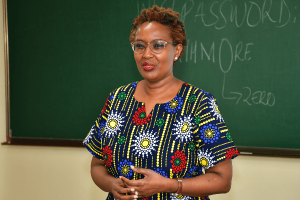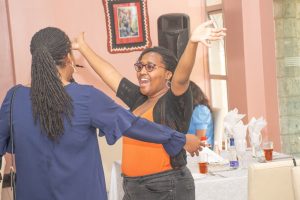International Humanitarian Law Guest on 17th March 2020, Brig. Nyagah & Col. Yator of the Kenya Army

On the 17th of March 2021, 4th Year Law students were privileged to receive a presentation on the Military Commander’s Perspective on the Law of Armed Conflict in view of the current situation in Somalia. This lecture was given by two distinguished military commanders, namely Brigadier Jeff Nyagah and Colonel Symon Yator.
Colonel Symon Yator took us through the first part of the presentation where he discussed asymmetrical warfare and explained how the situation in Somalia is an example of this kind of warfare.
The second part of the presentation was by Brigadier Jeff Nyagah who explained the practical side of the law of armed conflict. He gave his personal experience as an operational commander right at the heart of the conflict in Doble, Somalia. He started with the background of the Kenya Defence Force’s presence in Somalia, explaining they went there because of operation linda nchi in 2012. He also explained the legal basis of the AMISOM presence in Somalia, explaining that it is a UN security council resolution that gives them the mandate to be there.
Brigadier Nyagah also detailed some of the challenges faced as a result of the asymmetrical warfare in Somalia such as violations of International Humanitarian Law (IHL). He gives an example of Al Shabab operating in protected objects like mosques. As operation commander, he explains, one has to make difficult choices such as deciding whether this makes the mosque a legitimate military objective. Despite these challenges, Brigadier Nyagah assured us that they’ve had successes such as liberation of some zones and the promotion of accountability between AMISOM and the Somalia Security forces in terms of upholding the law of armed conflict.
The final part of the engaging lecture was the question and answer session where the students were joined by Brigadier Joseph Mweu who serves as a director at Strathmore. . The questions were relevant and brought forth informative answers. One of the thought-provoking questions asked was in relation to how the military dealt with terrorist groups and the challenges that may arise in doing so, specifically since the terrorists come prepared to die. Brigadier Nyagah answered this question stating that two things must be taken into account: the first, that such terrorist agents are not protected under international law and secondly, all soldiers have the right to self-defence. This led him to conclude that the soldiers have every right to use deadly force if the force the terrorist is using puts the troops in danger. He, however, gave the caveat that because of the operating environment, most civilians carry weapons, thus the rule of thumb is to first fire a warning shot and to ask them to comply in a language they understand.
The complexity of these situations was underlined by the two decorated commanders in the lecture. The importance of International Humanitarian Law in a practical sense was emphasised and the result was that the students got a better understanding of the course.
This article was written by Jamie Staussi and Arnold Ombasa, 4th year, SLS



